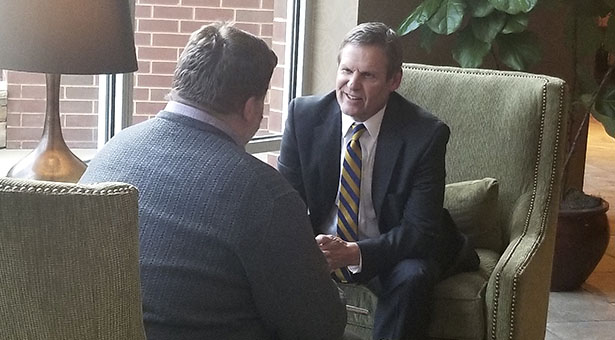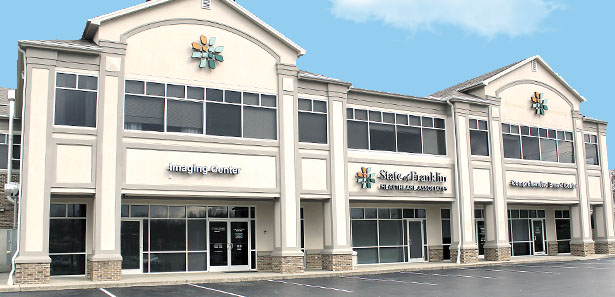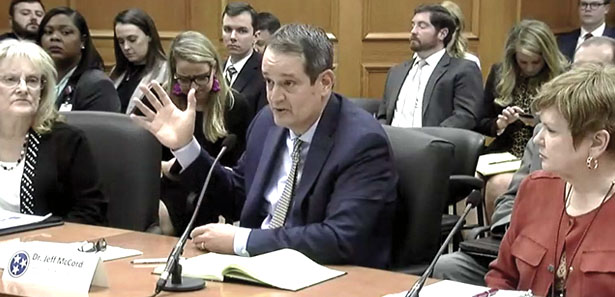Above: Governor Bill Lee and Business Journal Managing Editor Scott Robertson at the MeadowView Conference Resort & Convention Center. Photo courtesy State of Tennessee
During his 2018 campaign for governor, Bill Lee repeatedly made the point that Tennessee had done great things to improve college accessibility and graduation rates, but that he was interested in creating new pathways to prosperity for non-college-bound Tennesseans. Within a week of taking office, Lee was holding budget hearings (see page 20) in which he asked commissioners how they would work together for the betterment of Tennessee’s workforce. In addition, one of Lee’s first cabinet appointments was Dr. Jeff McCord, former vice president at Northeast State, as commissioner of Labor & Workforce Development. McCord is an authority on public-private partnerships in workforce development, having worked with the department to create an apprenticeship program at the Regional Center for Advanced Manufacturing (RCAM). The governor sat down with The Business Journal after his tour of the RCAM (see page 21), Feb. 1.
The Business Journal: You were at the RCAM today, your new commissioner of Labor’s old stomping grounds. So, let’s start with your choice of Dr. Jeff McCord for that position. What was it about his work that caught your attention?
Governor Bill Lee: Dr. McCord has a great deal of expertise in workforce development and has a real interest in something that is of great interest to me, vocational and technical education. I believe our education system has not put enough emphasis on vocational, technical and agricultural education for many decades. Because of that lack of focus in those areas we now have a real workforce problem. I used to run a company that was made up primarily of skilled tradespeople so I know the problem well from my private sector days, and I want to bring about a real focus on that. Dr. McCord understands that well and so I’m really excited about what he has to bring to state government.
The Business Journal: In Tennessee state government to date, there has already been a start to that kind of effort. Is Pathways Tennessee something you will continue with, perhaps something you will add onto?
Governor Bill Lee: I do think that what we have done to date has been valuable and a great step in the right direction. What I want to do is strengthen those approaches and add to that. We will be looking for ways to engage more kids in dual enrollment to give them more opportunity – particularly dual enrollment around vocational/technical skills to give them more opportunity to strengthen their pathway. We’re going to be looking at ways to direct resources and funding toward school systems that don’t have vocational/technical programs. We’re also looking to strengthen the counseling component of education so kids don’t just have college counseling in high school, but have career counselors – and to train our counselors to understand more broadly the pathways to success. We need to start that counseling even in junior high school so kids begin to think earlier about the options they have for attaining skills for a career that may or may not include post-secondary.
The Business Journal: You use the phrase starting early. One of the things brought up in today’s roundtable at the RCAM was something we’ve been hearing in covering workforce development for the last few years. Employers say, ‘We would love to get young people onto the floor for work-based learning, but our insurance people tell us they have to be 18 years old first.’ Now Gestamp* has their own work-based learning model in Chattanooga and VIAM* in Manchester also has under-18 students on the plant floor. So it can be done. Is that something you’re looking into making easier for employers?
Governor Bill Lee: Yes. We will be looking at that. One of the questions I asked today was, ‘What are the prohibiters in this process? What are the things that make it difficult? Earlier today we toured Gestamp and asked those same questions. One of those is the challenges around young people on the floor, but there are ways to address that and we want to look at greater opportunity for those kinds of dual-enrollment work-based learning initiatives. Transportation is a challenge in those situations. I asked about it up here. I ask about it every place that I tour. Transportation is always a challenge and we need to look to our partners in developing these programs and say, ‘How can we provide transportation for these young people?’ There’s a lot of great work being done. We just have to look at incremental ways we can improve that.
The Business Journal: One of the things we have heard from the public K-12 side is, ‘We’re not paid to produce future employees. We’re paid to meet specific standards, and if we take time away from doing that in order to do what it takes to give you employees with these other skills you say you need, we’re going to suffer for it because of the way our funding models are designed.’ So, are we hearing you say you’re going to change that in Tennessee?
Governor Bill Lee: I think education is much more than a test score. It is about preparing a child for success in life. That should be the goal of education. That includes academics and test scores and standards, but it also includes preparation for skills that are necessary for a career. I think it’s not ‘either/or.’ It’s ‘both/and.’ We have to figure out a way to accomplish both, to find a balance, to understand a new meaning for what life education looks like in this state. It looks different for different kids. It looks different for different regions. One-size-fits-all programs don’t work. So, I do think we will expand our understanding of what good education means. One thing to remember is that in our state right now, we have four out of ten kids that don’t go to college. We have done very little to prepare them for success in life. That is a part of the education system. So, while we want to direct children to four-year or two-year post-secondary attainment if that’s where they want to go, we also want to remind ourselves that four of ten kids don’t go, and our education system has to serve them as well.
The Business Journal: For all of this to work, there are elements that go beyond any one department of state government. You can look at this from a workforce development standpoint. You can look at it from an economic development standpoint. You can look at it from a health standpoint. You can look at it from corrections – combating recidivism –
Governor Bill Lee: – and education.
The Business Journal: When you look at all those things – and you’ve said government isn’t a solution – how do you keep government from tripping over itself and still getting all of these diverse aspects of state government to work together on solving one problem?
Governor Bill Lee: It’s a really good question and it’s something that we talked about in our administration right from the beginning. How are we going to align multiple departments that each touch this issue? There’s a lot of work being done in and across multiple departments. What we want to do is bring down the silos between those departments, get them together, and actually talk. We have brought together people from each of the departments that touch workforce development and we have started a process of determining where we need to integrate better – how it is that we need to leverage the strengths that lie in each department to work together and insure not only that we are not tripping over each other, but that we are actually multiplying the positive effects. That’s something we’re looking at as we speak.
The Business Journal: We’ve talked about partnerships, and of course, some businesses and some school systems have been working on this already. One thing we have heard from the private sector is, ‘Education doesn’t always hear exactly what we’re saying. We may tell them we need employees with this certification and then the schools train the students for a similar certification, but not the one we need.’ So how does government create a better environment for education and business to really hear one another?
Governor Bill Lee: I actually think that is one of the most important components of making this work. You see that at RCAM. You see industry designing programs and kids learning very specific skillsets they are going to use for companies right here in this community. That’s one of the reasons I came here. This is a really good example of a program that’s working. Young people are learning the exact skills necessary to be employed right out of the program. Business has to engage, and I believe one of the things we have got to do is compel business to become engaged. They will be the beneficiary of workforce development; they ought to be part of the solution. That’s been one of my admonitions to business leaders as I have traveled across the state: ‘Will you engage with the education system? Will you provide equipment, resources, curriculum development, even trainers where appropriate?’ Because you are exactly right. If industry doesn’t engage, the product that the education system produces is not going to be what industry needs. We have to have that partnership.
*Tennessee-based auto parts companies




